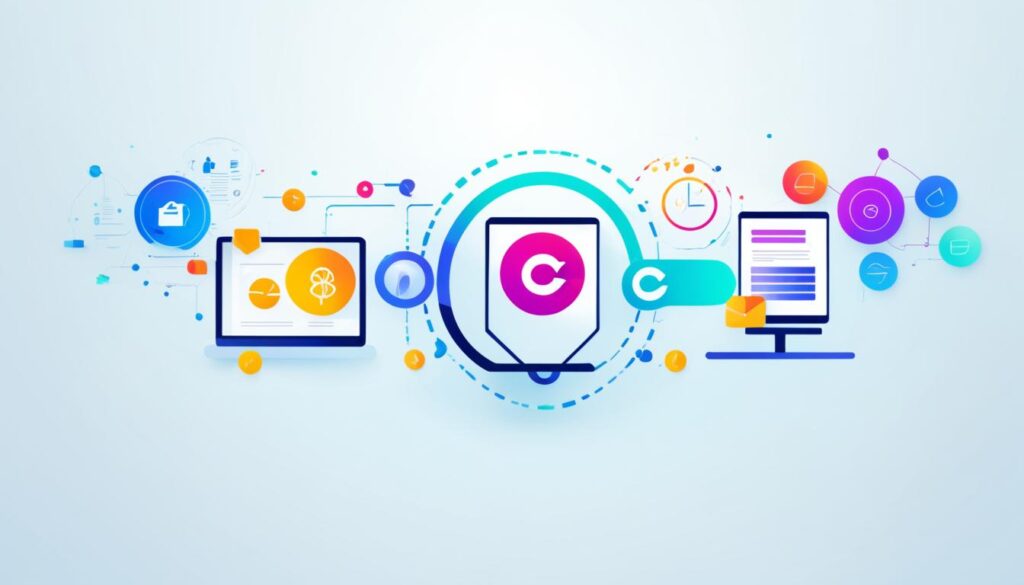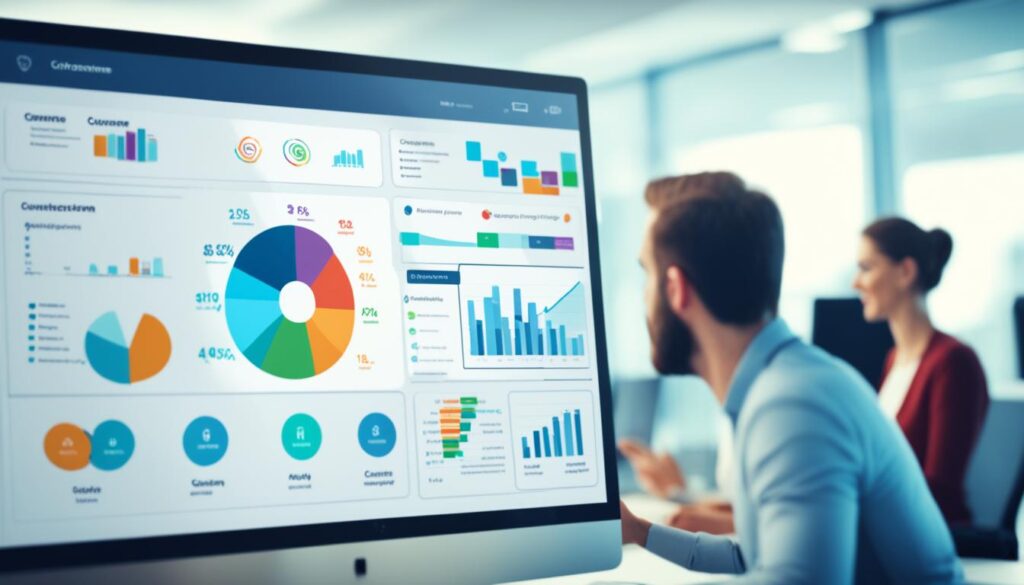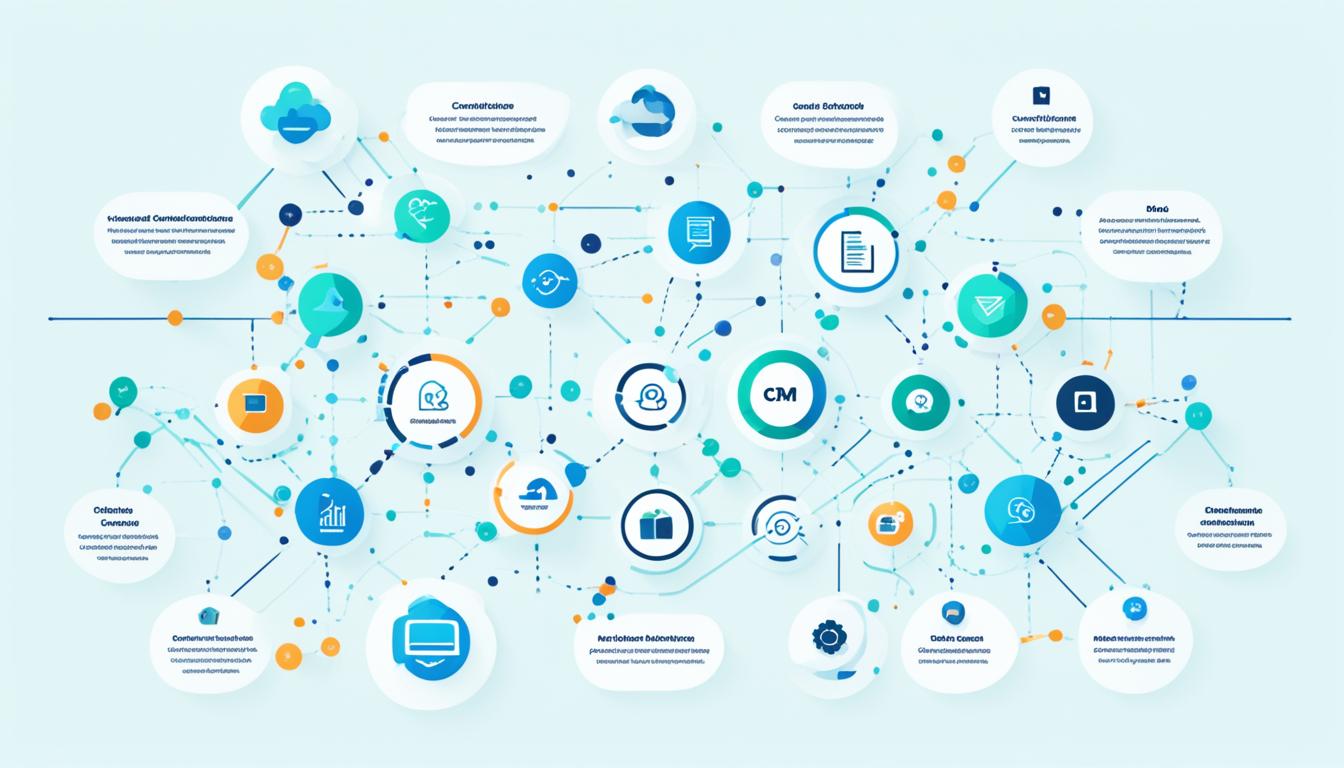Customer relationship management (CRM) and marketing automation software are powerful tools that can help businesses thrive in today’s competitive market. By leveraging CRM and marketing automation, companies can streamline sales processes, enhance customer engagement, and boost revenue growth.
CRM software, also known as customer relationship management software, is designed to manage contact and sales information, improve agent productivity, and optimize customer relationships throughout the sales funnel. It offers features such as email marketing and customer service interactions, enabling businesses to effectively nurture leads and provide exceptional customer experiences.
On the other hand, marketing automation platforms provide a range of digital marketing tools that automate repetitive marketing tasks and workflows. From email marketing automation to lead management software, marketing automation solutions empower businesses to deliver personalized and targeted marketing campaigns, saving time and resources.
By integrating CRM and marketing automation, businesses can achieve seamless data synchronization, enabling them to have a holistic view of their customers and prospects. This integrated approach allows for better lead qualification, more effective sales follow-ups, and enhanced customer interactions throughout the entire buyer’s journey.
For small businesses, implementing a CRM system and marketing automation platform is a game-changer. These tools provide the foundation for efficient sales and marketing operations, enabling businesses to focus on growth and customer satisfaction. With integrated CRM and automated marketing solutions, small businesses can compete with larger competitors and drive significant business growth.
Key Takeaways:
- CRM and marketing automation software are essential for maximizing growth in today’s competitive business landscape.
- CRM software helps manage contact and sales information, improves agent productivity, and optimizes customer relationships.
- Marketing automation platforms automate marketing tasks and workflows, enabling personalized and targeted marketing campaigns.
- Integrating CRM and marketing automation provides a holistic view of customers, enhancing lead qualification and customer interactions.
- For small businesses, CRM and marketing automation are crucial for competing with larger competitors and driving business growth.
What is CRM?
CRM, or customer relationship management, refers to software that handles contact and sales management, improves agent productivity, and manages customer relationships throughout the sales funnel. It includes features such as email marketing and customer service interactions. A CRM system stores information about customers, tracks interactions, and optimizes customer interactions, ultimately increasing sales and customer satisfaction.
CRM is an essential tool for businesses to effectively manage their customer relationships and streamline their sales processes. By implementing a CRM system, businesses can enhance their contact and sales management, improve agent productivity, and strengthen customer relationships.
One of the key features of CRM is its ability to manage customer interactions throughout the sales funnel. From prospecting to closing the deal, a CRM system helps businesses track and analyze customer interactions at each stage, allowing them to optimize their sales process and drive conversions.
The Benefits of CRM
| Benefits of CRM | Description |
|---|---|
| Improved Contact and Sales Management | CRM software provides a centralized platform for businesses to store and manage customer contact information, making it easier to track and follow up on leads. |
| Enhanced Agent Productivity | With CRM, agents have access to a comprehensive database of customer information, enabling them to provide personalized service and improve their efficiency. |
| Stronger Customer Relationships | By tracking customer interactions and preferences, CRM software helps businesses build stronger relationships with their customers through personalized communication and targeted marketing. |
| Streamlined Sales Funnel | A CRM system helps businesses optimize their sales process by providing insights into leads, conversions, and sales opportunities, allowing for better decision-making and a more efficient sales funnel. |
| Effective Email Marketing | CRM software often includes email marketing capabilities, enabling businesses to send targeted and automated email campaigns to engage with their customers and nurture leads. |
| Improved Customer Service Interactions | CRM systems facilitate better customer service interactions by providing agents with access to customer history, preferences, and previous interactions, enabling personalized and efficient support. |
Implementing a CRM system can bring numerous benefits to businesses, ranging from improved contact and sales management to enhanced customer relationships. By leveraging the functionalities of CRM software, businesses can optimize their sales funnel, increase agent productivity, and deliver better customer service.

How does CRM software work?
CRM software plays a crucial role in managing and nurturing relationships with active or potential customers. It operates by seamlessly tracking customer actions across various channels such as social media, email, and website interactions. This allows businesses to gather valuable information and insight into customer behavior, preferences, and interests.
By analyzing this collected data, CRM software enables businesses to guide each customer through a personalized customer journey. This journey involves leveraging automation tools, such as triggered emails, to deliver targeted messages or discounts based on specific customer actions or interests.
Gaining insights for enhanced customer engagement
CRM software empowers businesses by providing a deep understanding of their customer base. By leveraging social media activity, email response rates, and website engagement data, companies can tailor their marketing efforts and communication strategies to better resonate with customers.
Employing CRM software also means being able to trigger specific email campaigns based on customer actions. For instance, if a customer adds items to their online shopping cart but abandons the purchase, CRM software can automatically send a follow-up email reminding them of the items they left behind and offering a special discount to entice them to complete the purchase. This level of personalization and proactive engagement significantly increases the chances of converting leads into loyal customers.

Improving internal collaboration and customer service
CRM software not only enhances customer engagement but also facilitates efficient internal collaboration. When a customer expresses interest or raises a concern through any channel, the CRM software immediately alerts the appropriate employee or team. This real-time notification ensures that the customer’s needs are promptly addressed, fostering a positive customer experience.
Furthermore, CRM software acts as a centralized hub for customer information, allowing employees to access up-to-date data, including past interactions, preferences, and purchase history. This comprehensive view enables better-informed customer service, ensuring employees can provide personalized and relevant assistance.
Enhanced decision making through data-driven analytics
CRM software provides powerful analytics capabilities, which enable businesses to derive valuable insights from customer data. By analyzing patterns and trends, businesses can identify growth opportunities, improve marketing strategies, and forecast future customer behavior.
For example, through CRM analytics, businesses can identify their most valuable customer segments and tailor their marketing campaigns to target these high-potential groups effectively. This data-driven decision-making approach not only saves time and resources but also leads to improved customer acquisition and retention.
Benefits of CRM software
A CRM system offers numerous benefits that can greatly impact a business’s success. By implementing a CRM system, businesses can leverage advanced features and functionalities to improve efficiency, boost sales, and enhance customer satisfaction. Let’s explore some of the key benefits of using a CRM system:
1. Time and Cost Savings
An integrated CRM system automates repetitive tasks, eliminating the need for manual data entry and reducing administrative workload. This frees up valuable time for sales teams to focus on generating leads, nurturing customer relationships, and closing deals. Additionally, by streamlining processes and centralizing customer data, businesses can minimize costs associated with inefficient workflows and duplicate efforts.
2. Improved Lead Conversion
A CRM system enables businesses to effectively manage and track leads throughout the entire sales funnel. With access to comprehensive customer information and data analytics, sales teams can identify and prioritize high-value leads, increase conversion rates, and close deals more effectively. By leveraging lead scoring and nurturing capabilities, businesses can target the right prospects with personalized communication, ensuring higher conversion rates and increased sales opportunities.
3. Enhanced Organization and Task Tracking
A CRM system acts as a centralized hub for storing and organizing customer data, interactions, and communication history. This promotes greater organization within sales teams, enabling them to easily access and update customer information, track sales activities, and manage tasks efficiently. By providing a clear view of ongoing deals, deadlines, and follow-ups, CRM software helps sales teams stay organized and on top of their responsibilities.
4. Centralized Sales Progress Tracking
With a CRM system, businesses can gain real-time visibility into their sales pipeline and track the progress of deals at various stages. This allows sales managers to monitor individual and team performance, identify bottlenecks, and make data-driven decisions to optimize sales processes. By having a centralized system for tracking sales progress, businesses can effectively forecast revenue, identify potential risks or opportunities, and implement strategies to drive sales growth.
5. Personalized Communication
A CRM system enables businesses to foster personalized communication with customers. By capturing and analyzing customer preferences, behaviors, and interactions, businesses can tailor their messaging and engagement strategies to meet individual customer needs. CRM software facilitates targeted email campaigns, automates personalized follow-ups, and provides insights for effective communication, ultimately strengthening customer relationships and increasing customer satisfaction.
In summary, a CRM system offers significant benefits, including time and cost savings, improved lead conversion, enhanced organization and task tracking, centralized sales progress tracking, and personalized communication. By leveraging the power of CRM software, businesses can optimize their sales processes, increase efficiency, and foster stronger customer relationships, ultimately driving growth and success.
CRM examples
When it comes to CRM platforms, there are several options available. Let’s explore some popular choices:
Salesforce
Salesforce is a renowned cloud computing software-as-a-service company that specializes in CRM. With its robust features and comprehensive solutions, Salesforce offers businesses a powerful platform to manage their customer relationships effectively.
HubSpot
HubSpot provides a free CRM tool that offers real-time updates on sales pipelines and deal tracking. It is a valuable resource for businesses looking to streamline their sales processes and efficiently manage their customer interactions.
Freshsales
Freshsales stands out with its AI-powered lead scoring capabilities and a 360-degree view of customers. This comprehensive insight enables businesses to make informed decisions and deliver personalized experiences to their customers.
Pipedrive
Pipedrive is a user-friendly CRM platform that offers lead management and automation features. Its intuitive interface and powerful functionalities make it an excellent choice for businesses looking to enhance their sales processes and increase efficiency.
These CRM platforms provide businesses with the necessary tools to optimize their customer relationship management. They offer various features and functionalities designed to meet the diverse needs of different businesses. It’s essential for businesses to conduct CRM software reviews to find the best fit for their specific requirements.
CRM Comparison
| CRM Platform | Key Features | Pricing |
|---|---|---|
| Salesforce | Comprehensive CRM functionalities, customizable dashboards, advanced reporting and analytics | Starting from $25/user/month |
| HubSpot | Free CRM tool, contact management, email tracking, deal and task management | Freemium model, with additional features available in paid plans |
| Freshsales | AI-powered lead scoring, 360-degree view of customers, email and phone integration | Starting from $12/user/month |
| Pipedrive | Intuitive interface, lead management, automation features, sales pipeline visualization | Starting from $15/user/month |
The table above provides a quick comparison of key features and pricing for each CRM platform discussed. It’s important for businesses to evaluate their specific needs and budget when choosing the right CRM software for their organization.
With these CRM platforms, businesses can effectively manage their customer interactions, streamline sales processes, and enhance customer satisfaction. Whether it’s Salesforce, HubSpot, Freshsales, Pipedrive, or any other CRM software, finding the right fit can significantly impact a business’s success in building strong customer relationships and driving revenue growth.
Conclusion
Integrating CRM and marketing automation is crucial for business growth in today’s competitive market. By using CRM software, businesses can effectively manage customer interactions, optimize the sales funnel, and improve customer relationships. At the same time, marketing automation tools automate marketing tasks and workflows, enhancing customer engagement and driving revenue growth.
By combining the power of CRM and marketing automation, small businesses can unlock their full sales potential. CRM software allows businesses to personalize customer experiences and provide tailored communication, resulting in increased customer satisfaction. Marketing automation streamlines sales processes, saving time and resources while maximizing lead conversion rates.
To stay ahead and succeed in the market, small businesses should consider the integration of CRM and marketing automation. These tools not only improve customer relationships and sales processes but also pave the way for revenue growth. By harnessing the power of CRM and marketing automation, businesses can achieve business growth, increase customer engagement, and drive long-term success.
FAQ
What is CRM?
CRM, or customer relationship management, refers to software that handles contact and sales management, improves agent productivity, and manages customer relationships throughout the sales funnel. It includes features such as email marketing and customer service interactions.
How does CRM software work?
CRM software works by tracking the actions of active or potential customers through various channels such as social media, email, and website. It gathers and analyzes information about customer interactions and guides each contact through a customer journey, such as sending a triggered email or alerting an employee of the customer’s interest. This helps businesses personalize their communication and improve customer engagement.
What are the benefits of CRM software?
There are several benefits to using a CRM system. It helps businesses save time and money by automating tasks and organizing customer contact information. A CRM system also improves lead conversion rates, provides insights for sales progress tracking, and enables personalized communication with customers. By utilizing a CRM system, businesses can improve overall organization, increase sales opportunities, and boost customer satisfaction.
Can you give examples of CRM platforms?
Some popular CRM platforms include Salesforce, HubSpot, Freshsales, and Pipedrive. Salesforce is a cloud computing software-as-a-service company that specializes in CRM. HubSpot offers a free CRM tool with real-time updates on sales pipelines and deal tracking. Freshsales provides AI-powered lead scoring and a 360-degree view of customers. Pipedrive is a user-friendly CRM with lead management and automation features. There are various CRM software options available, and businesses can conduct CRM software reviews to find the best fit for their needs.
How can CRM and marketing automation contribute to business growth?
Integrating CRM and marketing automation can significantly contribute to business growth by improving customer relationships, streamlining sales processes, and enhancing customer engagement. CRM software enables businesses to effectively manage customer interactions and optimize the sales funnel, while marketing automation automates marketing tasks and workflows. By combining these two systems, businesses can maximize their sales potential, personalize customer experiences, and drive revenue growth. It is crucial for small businesses to consider the integration of CRM and marketing automation to stay ahead in today’s competitive market.








